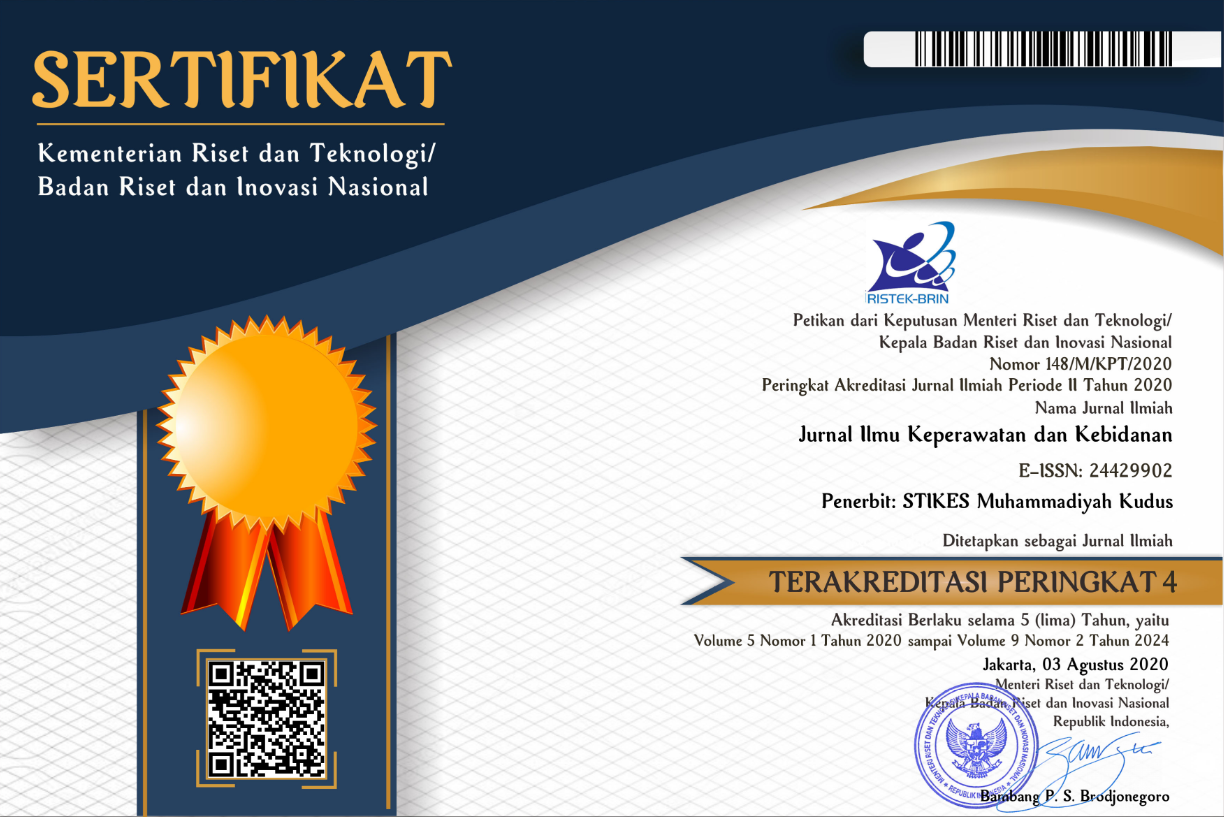THE DESCRIPTION OF KNOWLEDGE, PERCEPTION, ROLE, ROLE IMPLEMENTATION, EMOTIONAL CONNECTION IN PSYCHOSEXUAL DEVELOPMENT OF CHILDREN AGED 3-5 YEARS IN NEW NORMAL PERIOD AT THE SUBURBAN OF SURABAYA
Abstract
The number of pornography and cybercrime among Indonesian children reaches 4448 cases – children as a perpetrator and victim. Meanwhile, Indonesian children experience 183 cases of rape and sexual abuse, 54 cases of sodomy or pedophilia – children as a perpetrator, 42 cases of sodomy or pedophilia – children as a victim, and 44 cases of abortion. Preliminary study on March 2020 in West Surabaya showed that 6 in 10 children aged 3-5 years faced sexual abuse or harassment and rape by their closest circle. The research aims are to describe the level of knowledge, perception, role implementation, emotional connection between father and child in the accompaniment of psychosexual development of children. This paper combined quantitative and qualitative methodologies with a phenomenological approach. Respondents were father compatible with inclusion criteria – was determined by researchers. This study used total sampling – 112 fathers lived in West Surabaya. The research instruments were questionnaire and observation sheet. Data analysis utilized percentage analysis, data reduction, and data triangulation.
Result: There were 64.5% low level of knowledge, 70.5% negative perception, 63.4% father absence in assisting psychosexual development of children, and 69.6% absence of emotional connection.
Conclusion: The father’s role in assisting the psychosexual development of children aged 3-5 years can decrease the number of psychosexual disorders in adulthood.
Keywords: knowledge, perception, role, role implementation, father, child’s psychosexual
Full Text:
PDFReferences
Afrasiabi, H., & Junbakhsh, M. (2019). Meanings and Experiences of Being Transgender: A Qualitative Study among Transgender Youth. The Qualitative Report, 24(8), COV4.
Ashbourne, L. M., Daly, K. J., & Brown, J. L. (2011). Responsiveness in Father-Child Relationships: The Experience of Fathers. Fathering: A Journal of Theory, Research, and Practice about Men as Fathers, 9(1), 69–86. https://doi.org/10.3149/fth.0901.69
Bagner, D. M. (2013). Father’s role in parent training for children with developmental delay. Journal of Family Psychology, 27(4), 650–657. https://doi.org/10.1037/a0033465
Bannink, R., Broeren, S., Van De Looij-Jansen, P. M., & Raat, H. (2013). Associations between parent-adolescent attachment relationship quality, negative life events and mental health. PLoS ONE, 8(11), 1–8. https://doi.org/10.1371/journal.pone.0080812
Baxter, J., & Smart, D. (2011). Fathering in Australia among couple families with young children research highlights. In Family Matters (Vol. 88, Issue 1).
Borisenko, J. V., & Evseenkova, E. V. (2019). Differences in fathering among Russian men brought up with and without a father. Psychology in Russia: State of the Art, 12(3), 105–120. https://doi.org/10.11621/pir.2019.0308
Bradford, J., Reisner, S. L., Honnold, J. A., & Xavier, J. (2013). Experiences of transgender-related discrimination and implications for health: Results from the Virginia transgender health initiative study. American Journal of Public Health, 103(10), 1820–1829. https://doi.org/10.2105/AJPH.2012.300796
Burkey, M. D., Adhikari, R. P., Ghimire, L., Kohrt, B. A., Wissow, L. S., Luitel, N. P., Haroz, E. E., & Jordans, M. J. D. (2018). Validation of a cross-cultural instrument for child behavior problems: The Disruptive Behavior International Scale - Nepal version. BMC Psychology, 6(1). https://doi.org/10.1186/s40359-018-0262-z
Chauke, P., & Khunou, G. (2015). Shaming Fathers into Providers: Child Support and Fatherhood in the South African Media. The Open Family Studies Journal, 6(1), 18–23. https://doi.org/10.2174/1874922401406010018
Conron, K. J., Mimiaga, M. J., & Landers, S. J. (2010). A population-based study of sexual orientation identity and gender differences in adult health. American Journal of Public Health, 100(10), 1953–1960. https://doi.org/10.2105/AJPH.2009.174169
Constantin, A., & Voicu, M. (2015). Attitudes Towards Gender Roles in Cross-Cultural Surveys: Content Validity and Cross-Cultural Measurement Invariance. Social Indicators Research, 123(3), 733–751. https://doi.org/10.1007/s11205-014-0758-8
Cosson, B., & Graham, E. (2012). “I felt like a third wheel”: Fathers’ stories of exclusion from the ’parenting team. Journal of Family Studies, 18(2–3), 121–129. https://doi.org/10.5172/jfs.2012.18.2-3.121
Evans, C., Tweheyo, R., McGarry, J., Eldridge, J., Albert, J., Nkoyo, V., & Higginbottom, G. M. A. (2019). Seeking culturally safe care: A qualitative systematic review of the healthcare experiences of women and girls who have undergone female genital mutilation/cutting. BMJ Open, 9(5). https://doi.org/10.1136/bmjopen-2018-027452
Fagan, J., & Lee, Y. (2012). Effects of fathers’ and mothers’ cognitive stimulation and household income on toddlers’ cognition: Variations by family structure and child risk. Fathering, 10(2), 140–158. https://doi.org/10.3149/fth.1002.140
Fantuzzi-Chapman, L. M. (2012). The relationship between the home literacy environment, family background, parent-child attachment, and parent behaviors on children’s early reading skills. ProQuest Dissertations and Theses, 86. http://flagship.luc.edu/login?url=http://search.proquest.com/docview/1234067418?accountid=12163%5Cnhttp://loyola-primo.hosted.exlibrisgroup.com/openurl/01LUC/01LUC_SERVICES?genre=dissertations+%26+theses&issn=&title=The+relationship+between+the+home+liter
Fatehi, S., Maasoumi, R., Atashsokhan, G., Hamidzadeh, A., Janbabaei, G., & Mirrezaie, S. M. (2019). The effects of psychosexual counseling on sexual quality of life and function in Iranian breast cancer survivors: a randomized controlled trial. Breast Cancer Research and Treatment, 175(1), 171–179. https://doi.org/10.1007/s10549-019-05140-z
Gareth D. Mercer B.Sc. (2015). Do fathers care ? Measuring mothers ’ and fathers ’ perceptions of fathers ’ involvement in caring for young children in South Africa by (Issue July) [The University of British Columbia]. https://www.semanticscholar.org/paper/Do-fathers-care-Measuring-mothers’-and-fathers’-of-Mercer/da425bb68746f2b3f9407442f9142eb19b2988c3
Gonzalez, C. A., Gallego, J. D., & Bockting, W. O. (2017). Demographic Characteristics, Components of Sexuality and Gender, and Minority Stress and Their Associations to Excessive Alcohol, Cannabis, and Illicit (Noncannabis) Drug Use Among a Large Sample of Transgender People in the United States. Journal of Primary Prevention, 38(4), 419–445. https://doi.org/10.1007/s10935-017-0469-4
Hill, B. J., Rosentel, K., Bak, T., Silverman, M., Crosby, R., Salazar, L., & Kipke, M. (2017). Exploring Individual and Structural Factors Associated with Employment among Young Transgender Women of Color Using a No-Cost Transgender Legal Resource Center. Transgender Health, 2(1), 29–34. https://doi.org/10.1089/trgh.2016.0034
Huang, Y. (2017). AN EVALUATION OF THE HEAD START PARENT , FAMILY , AND COMMUNITY ENGAGEMENT ( PFCE ) FRAMEWORK ON THE PERCEPTION OF A FATHER ’ S ROLE AND THE FATHER ’ S INVOLVEMENT FACTS WITH THE HEAD START PROGRAMS Presented to The College of Graduate and Professional St (Issue May) [Indiana State University]. https://search.proquest.com/docview/1916572509/fulltextPDF/35D2FDD6FA88435DPQ/1?accountid=170128
J., T., J., P., E., S., & M., R. (2020). Bisexual mental health and gender diversity: Findings from the “Who I Am” study. Australian Journal of General Practice, 49(7), 392–399. http://www.embase.com/search/results?subaction=viewrecord&from=export&id=L632237640%0Ahttp://dx.doi.org/10.31128/ajgp-09-19-5073
Kanhere, M., Fuqua, J., Rink, R., Houk, C., Mauger, D., & Lee, P. A. (2015). Psychosexual development and quality of life outcomes in females with congenital adrenal hyperplasia. International Journal of Pediatric Endocrinology, 2015(1), 1–10. https://doi.org/10.1186/s13633-015-0017-z
Kar, S., Choudhury, A., & Singh, A. (2015). Understanding normal development of adolescent sexuality: A bumpy ride. Journal of Human Reproductive Sciences, 8(2), 70–74. https://doi.org/10.4103/0974-1208.158594
Klika, J. B., Haboush-Deloye, A., & Linkenbach, J. (2019). Hidden Protections: Identifying Social Norms Associated with Child Abuse, Sexual Abuse, and Neglect. Child and Adolescent Social Work Journal, 36(1), 5–14. https://doi.org/10.1007/s10560-018-0595-8
Kwok, S. Y. C. L., & Li, B. K. K. (2015). A Mediation Model of Father Involvement with Preschool Children in Hong Kong. Social Indicators Research, 122(3), 905–923. https://doi.org/10.1007/s11205-014-0708-5
Lathrop, B., & Cheney, T. (2015). Ethical perspectives on the management of disorders of sex development in children. Medicolegal and Bioethics, 27. https://doi.org/10.2147/mb.s63708
Latifnejad Roudsari, R., Javadnoori, M., Hasanpour, M., Hazavehei, S. M. M., & Taghipour, A. (2013). Sociocultural challenges to sexual health education for female adolescents in Iran. Iranian Journal of Reproductive Medicine, 11(2), 101–110.
Leidy, M. S., Schofield, T. J., Miller, M. A., Parke, R. D., Coltrane, S., Braver, S., Cookston, J., Fabricius, W., Saenz, D., & Adams, M. (2011). Fathering and Adolescent Adjustment: Variations by Family Structure and Ethnic Background. Fathering: A Journal of Theory, Research, and Practice about Men as Fathers, 9(1), 44–68. https://doi.org/10.3149/fth.0901.44
Leung, H., Shek, D. T. L., Leung, E., & Shek, E. Y. W. (2019). Development of contextually-relevant sexuality education: Lessons from a comprehensive review of adolescent sexuality education across cultures. International Journal of Environmental Research and Public Health, 16(4). https://doi.org/10.3390/ijerph16040621
Mncanca, M., & Okeke, C. I. O. (2016). Positive Fatherhood: A Key Synergy for Functional Early Childhood Education in South Africa. Journal of Sociology and Social Anthropology, 7(4), 221–232. https://doi.org/10.1080/09766634.2016.11885720
Mncanca, M., Okeke, C. I. O., & Fletcher, R. (2016). Black Fathers’ Participation in Early Childhood Development in South Africa: What Do We Know? Journal of Social Sciences, 46(3), 202–213. https://doi.org/10.1080/09718923.2016.11893528
Morgenroth, T., & Ryan, M. K. (2018). Gender Trouble in Social Psychology: How Can Butler’s Work Inform Experimental Social Psychologists’ Conceptualization of Gender? Frontiers in Psychology, 9(July), 1–9. https://doi.org/10.3389/fpsyg.2018.01320
Mufutau, M. A., & Okeke, C. I. O. (2016). Factors Affecting Rural Men’s Participation in Children’s Preschool in One Rural Education District in the Eastern Cape Province. Studies of Tribes and Tribals, 14(1), 18–28. https://doi.org/10.1080/0972639x.2016.11886728
Pássaro, A. de C., Regra, M. C., Serrão, C., & Marques, A. P. (2019). Cultural adaptation and reliability of the questionnaire of sex education in schools. Ciencia & Saude Coletiva, 24(7), 2601–2608. https://doi.org/10.1590/1413-81232018247.14892017
Pereira, A. I., & Barros, L. (2019). Parental Cognitions and Motivation to Engage in Psychological Interventions: A Systematic Review. Child Psychiatry and Human Development, 50(3), 347–361. https://doi.org/10.1007/s10578-018-0852-2
Piotrowska, P. J., Tully, L. A., Lenroot, R., Kimonis, E., Hawes, D., Moul, C., Frick, P. J., Anderson, V., & Dadds, M. R. (2017). Mothers, Fathers, and Parental Systems: A Conceptual Model of Parental Engagement in Programmes for Child Mental Health—Connect, Attend, Participate, Enact (CAPE). Clinical Child and Family Psychology Review, 20(2), 146–161. https://doi.org/10.1007/s10567-016-0219-9
Richter, L., Chikovore, J., & Makusha, T. (2010). The Status of Fatherhood and Fathering in South Africa. Childhood Education, 86(6), 360–365. https://doi.org/10.1080/00094056.2010.10523170
Ristori, J., Cocchetti, C., Romani, A., Mazzoli, F., Vignozzi, L., Maggi, M., & Fisher, A. D. (2020). Brain sex differences related to gender identity development: Genes or hormones? International Journal of Molecular Sciences, 21(6). https://doi.org/10.3390/ijms21062123
Roskam, I., Meunier, J. C., & Stievenart, M. (2016). Do Mothers and Fathers Moderate the Influence of Each Other’s Self-efficacy Beliefs and Parenting Behaviors on Children’s Externalizing Behavior? Journal of Child and Family Studies, 25(6), 2034–2045. https://doi.org/10.1007/s10826-016-0365-1
Ruberg, B., & Ruelos, S. (2020). Data for queer lives: How LGBTQ gender and sexuality identities challenge norms of demographics. Big Data and Society, 7(1). https://doi.org/10.1177/2053951720933286
Salami, I. A., & Okeke, C. I. O. (2018). Absent fathers’ socioeconomic status and perceptions of fatherhood as related to developmental challenges faced by children in South Africa. South African Journal of Childhood Education, 8(1), 1–8. https://doi.org/10.4102/sajce.v8i1.522
Sandstrom, H., Pratt, E., Peters, H. E., & Heller, C. (2015). Approaches to Father Engagement and Fathers ’ Experiences in Home Visiting Programs. November.
Sato, M., Oshitani, H., Tamaki, R., Oyamada, N., Sato, K., Nadra, A. R., Landicho, J., Alday, P. P., Lupisan, S., & Tallo, V. L. (2018). Father’s roles and perspectives on healthcare seeking for children with pneumonia: Findings of a qualitative study in a rural community of the Philippines. BMJ Open, 8(11). https://doi.org/10.1136/bmjopen-2018-023857
Shwalb, D. W., & Shwalb, B. J. (2014). Fatherhood in Brazil, Bangladesh, Russia, Japan, and Australia. Online Readings in Psychology and Culture, 6(3), 1–21. https://doi.org/10.9707/2307-0919.1125
Verma, R., Mina, S., Ul-Hassan, S., & Balhara, Y. P. (2013). A descriptive analysis of patients presenting to psychosexual clinic at a tertiary care center. Indian Journal of Psychological Medicine, 35(3), 241–247. https://doi.org/10.4103/0253-7176.119473
DOI: https://doi.org/10.26751/jikk.v12i1.883
Refbacks
- There are currently no refbacks.
Universitas Muhammadiyah Kudus - LPPM Universitas Muhammadiyah Kudus
Jl. Ganesha 1 Purwosari Kudus 59316
Tel/ Fax +62-291-437218 Email : [email protected]
Jurnal Ilmu Keperawatan dan Kebidanan Indexed by:

This work is licensed under a Creative Commons Attribution-ShareAlike 4.0 International License.













